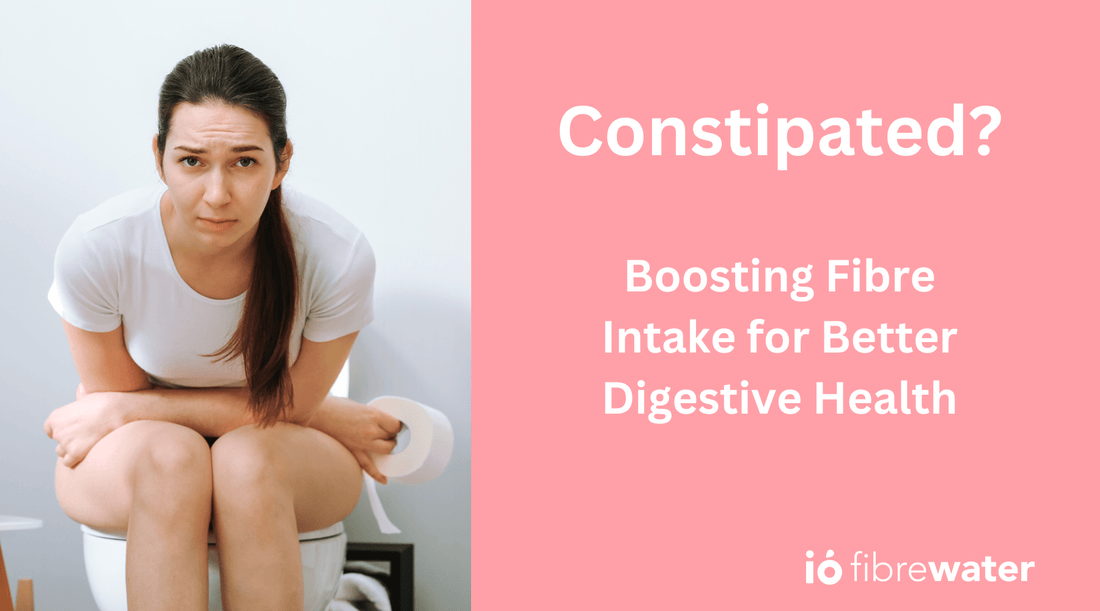There's a silent struggle of constipation due to the fibre deficiency epidemic gripping the UK.
According to the NHS a jaw-dropping 1 in 3 children and 1 in 7 adults are affected by constipation, the consequences extend beyond personal discomfort, costing the NHS over £200 million annually.
Here's why... Shockingly, 91% of the population falls short on daily fibre consumption, leading to an alarming rise in constipation rates.
However, there's hope – a simple solution lies in adopting higher-fibre diets to prevent constipation and reduce the burden on healthcare resources.
Understanding Constipation

Constipation is more than just an occasional inconvenience; it's a condition characterised by infrequent bowel movements, difficulty passing stools, and the sensation of incomplete evacuation.
It can lead to discomfort, bloating, abdominal pain, and even more severe health issues if left untreated. The root cause often lies in dietary habits, with a lack of fibre being a primary contributor, as well as proper hydration.
How often should you poop?
The frequency of bowel movements can vary widely among individuals, and what is considered normal can range from three times a day to three times a week. In general, it's not solely about the number of bowel movements but also about the ease of passing stools and the absence of discomfort.
Find out more:
5 Signs of Constipation (& Natural Solutions)
Fibre Deficiency: A Widespread Issue
Fibre is an essential component of a healthy diet, playing a crucial role in maintaining digestive health. However, the majority of the UK population falls short of meeting the recommended daily intake. Fibre is found in fruits, vegetables, whole grains, and legumes, providing bulk to the stool, promoting regular bowel movements, and preventing constipation.
But let's face it...
Fibre is considered by most people to be bland, boring, brown, and blah. (Keep reading! We have an exciting solution!).
The Impact of Constipation on Children and Adults

The prevalence of constipation is alarming, affecting both children and adults. Constipation is not only uncomfortable and even painful, it can affect work, sleep, school, socialising and eating properly.
Children's diets, often high in processed foods and low in fibre, contribute significantly to this issue. Additionally, adults with busy lifestyles may prioritise convenience over nutritional content, leading to insufficient fibre intake.
These dietary choices have consequences, and the rise in constipation rates is evidence of the urgent need for awareness and change.
Furthermore, in addition to poor diets that are lacking fibre (not to mention proper nutrition across the board), there is an elephant in the room...
Pooping is considered as 'dirty', we don't talk about it because it is considered as taboo. Many children now think that pooping is bad, and as a result, they are holding it in at school - and at home, causing a wide range of issues, including impaction and subsequent hospital visits.
In fact, vomiting fecal matter can happen due to a blockage in the intestines which can be caused by constipation. #Fact
We NEED to talk about pooping! It is a normal bodily function, and we need to ensure that our children understand this!
Read more: Kids & Constipation - Six tips that can help!
Laxatives aren't a long-term solution...

While laxatives can be effective in relieving constipation, (and are the go-to for doctors to prescribe) there are potential dangers and side effects associated with their misuse or overuse. It's important to use laxatives under the guidance of a healthcare professional and adhere to recommended dosages.
Here are some potential dangers and considerations associated with laxative use:
-
Dependency:
- Overreliance on laxatives can lead to dependency, where the bowel becomes reliant on laxative stimulation for regular movements. This can result in a loss of natural bowel function.
-
Dehydration:
- Certain types of laxatives, particularly stimulant laxatives, can lead to increased fluid loss from the body. Prolonged use may result in dehydration, electrolyte imbalances, and other complications.
-
Electrolyte Imbalances:
- Some laxatives can cause an imbalance in electrolytes, such as potassium, sodium, and magnesium. Electrolyte imbalances can lead to muscle weakness, cramps, irregular heartbeats, and other serious health issues.
-
Digestive System Damage:
- Chronic use of certain laxatives can damage the nerves, muscles, and tissues of the digestive system, leading to a condition known as laxative-induced enteropathy.
-
Reduced Nutrient Absorption:
- Laxatives can accelerate the passage of food through the digestive tract, potentially reducing the absorption of nutrients from the intestines.
-
Colon Damage:
- Long-term use of stimulant laxatives may damage the nerves and muscles of the colon, a condition known as cathartic colon, which can result in chronic constipation.
-
Rectal Dysfunction:
- Overuse of laxatives can lead to rectal dysfunction, making it difficult for the rectum to contract properly. This can contribute to a cycle of dependence on laxatives.
The above is super important to understand! A friend of mine's son has been on laxatives since he was two years old. He is now 14, and has NO control over his bowels. This misuse has caused lifelong damage. (Imagine dealing with this as a teenager?!).
An easy (delicious!) solution for constipation relief
ió fibrewater is the UK's first fibre-infused water that's crystal clear (and made with soluble prebiotic fibre) yet tastes, looks and feels just like bottled water with just a splash of natural fruit flavour. And it is not a laxative!
ió is an easy, enjoyable, and convenient way to boost your fibre intake, hydrate, and support your gut health. Here's more info:
- 20% daily fibre in every bottle
- Scientifically proven
- Prebiotic - with 100% of your daily recommended prebiotics in every bottle- feeds your friendly gut bacteria
- No sugar added & no nasty artificial sweeteners, flavours, colours or preservatives
- Vegan Society-approved & gluten-free
- Suitable for kids aged 2+
- A great swap-up from your usual drinks
In addition to having an authorised health claim for 'supporting proper gut function through increased stool frequency', ió can also help with IBS, bloating, and other digestive issues, too!
Prebiotics & constipation
You have probably heard about probiotics - live cultures found in fermented foods such as kefir, saurkraut, yogurt, and in supplement form.
Prebiotics are the food for probiotics - to help them thrive, survive, and promote the growth and activity of beneficial bacteria in your gut. They are typically non-digestible fibres found in certain foods, with the best source coming from chicory root fibre.
Consuming prebiotics can positively influence the gut microbiome, potentially alleviating constipation.
ió fibrewater delivers 100% of your daily prebiotic intake and is made with prebiotic chicory root fibre. Our revolutionary functional water is scientifically proven to increase your friendly gut bacteria significantly.*
Get up to 22% off ió!
Conclusion
Constipation is a pervasive issue affecting a significant portion of the UK population, and the staggering costs associated with it highlight the urgency of addressing this problem. It's time to prioritise digestive health and ensure that a fibre-rich diet becomes a cornerstone of our overall well-being.
An easy way to boost your fibre intake is by drinking one bottle of ió fibrewater daily to reduce constipation and support your gut and overall health and wellbeing.
------------------------------------------------------------------------------------------------------------
*A Glasgow Caledonian University study found that ió fibrewater increased friendly gut microbes (probiotics) significantly. You can read about this exciting study here.





